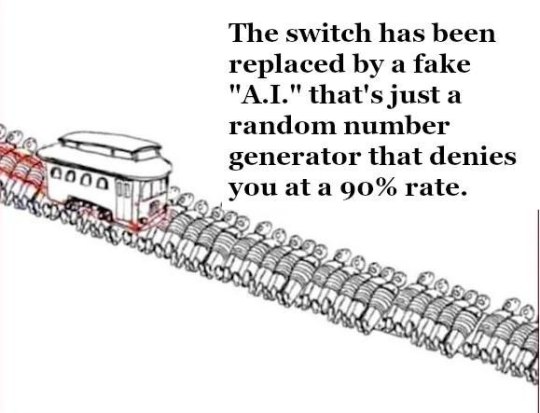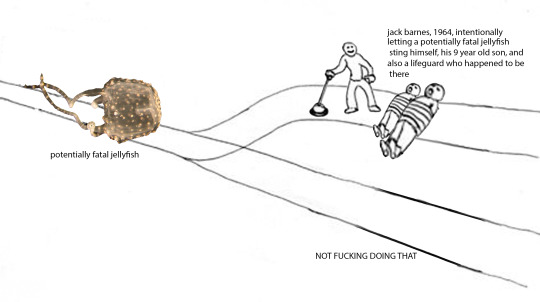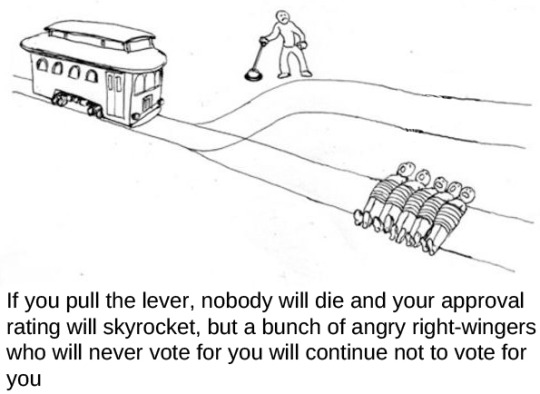#Trolley problem
Explore tagged Tumblr posts
Text

New reaction pic for y'all to be used when you get into an argument about trans healthcare and your opponent starts talking about the 0.8% or whatever of trans people who regret transitioning
#trans healthcare#trans rights are human rights#trans rights#transgender#trans#reaction pic#trolley problem#1k#2k#5k#10k#most popular
67K notes
·
View notes
Text

They will decide to kill you eventually.
#the trolley problem#trolley problem#ausgov#politas#australia#artificial intelligence#anti artificial intelligence#anti ai#fuck ai#brian thompson#united healthcare#unitedhealth group inc#uhc ceo#uhc shooter#uhc generations#uhc assassin#uhc lb#uhc#fuck ceos#ceo second au#ceo shooting#tech ceos#ceos#ceo down#ceo information#ceo#auspol#tasgov#taspol#fuck neoliberals
4K notes
·
View notes
Text
This was a good use of my two hours
13K notes
·
View notes
Text
I thought tumblr might find this Trump tariff trolley problem both tragic and telling

#us politics#donald trump#anti trump#trump tariffs#current events#Tesla#the trolley problem#trolley problem#united states#tariffs#stock market
1K notes
·
View notes
Text
There's a runaway trolley careening down the tracks. There are five guys tied to the tracks, three of whom you were peripherally acquainted with in college and they were just absolutely dogshit human beings, super awful to be around, bad to their friends, bad to their partners, they take and take and take and never give and never learn, you've been following the trainwrecks on facebook and they have not improved or matured at all. The fourth guy you used to work with and he's, like, fine on a moral level, you guess, but his personal aesthetic never advanced past that mid-2010s Narwhal-bacon MBmBaM-styled twee insufferability and while you don't wish death on him per se you're glad you're no longer coworkers 'and if you save him you're 90 percent sure you're gonna get an earful over accepting the terms of the trolley problem at face value without trying to find some non-existent kobiyashi maru third option. Fifth guy won the nobel prize for his oncology research and will certainly continue to do great work in the field but is also deeply suicidal to an extent that he would prefer to be run over by the trolley, the other four guys are screaming and crying but he's hooting and hollering. Tied to the other rail is your brother-in-law, who's great with your sister's kids but bad with finance and owes you about two grand from the last time you had to dig him out of a hole for your sister's sake, which you realistically won't get back regardless but definitely won't get back if you allow him to be crushed by a runaway trolley. Make your call
1K notes
·
View notes
Text

2K notes
·
View notes
Text

i had an idea to modernize the trolley problem
1K notes
·
View notes
Text

#original coast#irukandji jellyfish#irukandji syndrome#cubozoa#trolley problem#hey everyone guess who learned a little photoshop :3 it was me. i did. and this is what im doing instead of yknow anything important#jellyfish#marine life#sea creatures
6K notes
·
View notes
Text
"The idea of reforming Omelas is a pleasant idea, to be sure, but it is one that Le Guin herself specifically tells us is not an option. No reform of Omelas is possible — at least, not without destroying Omelas itself:
If the child were brought up into the sunlight out of that vile place, if it were cleaned and fed and comforted, that would be a good thing, indeed; but if it were done, in that day and hour all the prosperity and beauty and delight of Omelas would wither and be destroyed. Those are the terms.
'Those are the terms', indeed. Le Guin’s original story is careful to cast the underlying evil of Omelas as un-addressable — not, as some have suggested, to 'cheat' or create a false dilemma, but as an intentionally insurmountable challenge to the reader. The premise of Omelas feels unfair because it is meant to be unfair. Instead of racing to find a clever solution ('Free the child! Replace it with a robot! Have everyone suffer a little bit instead of one person all at once!'), the reader is forced to consider how they might cope with moral injustice that is so foundational to their very way of life that it cannot be undone. Confronted with the choice to give up your entire way of life or allow someone else to suffer, what do you do? Do you stay and enjoy the fruits of their pain? Or do you reject this devil’s compromise at your own expense, even knowing that it may not even help? And through implication, we are then forced to consider whether we are — at this very moment! — already in exactly this situation. At what cost does our happiness come? And, even more significantly, at whose expense? And what, in fact, can be done? Can anything?
This is the essential and agonizing question that Le Guin poses, and we avoid it at our peril. It’s easy, but thoroughly besides the point, to say — as the narrator of 'The Ones Who Don’t Walk Away' does — that you would simply keep the nice things about Omelas, and work to address the bad. You might as well say that you would solve the trolley problem by putting rockets on the trolley and having it jump over the people tied to the tracks. Le Guin’s challenge is one that can only be resolved by introspection, because the challenge is one levied against the discomforting awareness of our own complicity; to 'reject the premise' is to reject this (all too real) discomfort in favor of empty wish fulfillment. A happy fairytale about the nobility of our imagined efforts against a hypothetical evil profits no one but ourselves (and I would argue that in the long run it robs us as well).
But in addition to being morally evasive, treating Omelas as a puzzle to be solved (or as a piece of straightforward didactic moralism) also flattens the depth of the original story. We are not really meant to understand Le Guin’s 'walking away' as a literal abandonment of a problem, nor as a self-satisfied 'Sounds bad, but I’m outta here', the way Vivier’s response piece or others of its ilk do; rather, it is framed as a rejection of complacency. This is why those who leave are shown not as triumphant heroes, but as harried and desperate fools; hopeless, troubled souls setting forth on a journey that may well be doomed from the start — because isn’t that the fate of most people who set out to fight the injustices they see, and that they cannot help but see once they have been made aware of it? The story is a metaphor, not a math problem, and 'walking away' might just as easily encompass any form of sincere and fully committed struggle against injustice: a lonely, often thankless journey, yet one which is no less essential for its difficulty."
- Kurt Schiller, from "Omelas, Je T'aime." Blood Knife, 8 July 2022.
#kurt schiller#ursula k. le guin#quote#quotations#the ones who walk away from omelas#trolley problem#activism#introspection#discomfort#reform#revolution#suffering#ethics#morality
11K notes
·
View notes
Text

based on real events (me right now, posting this high from the amtrak)
#trolley problem#the trolley problem#trolley problem memes#trolley problem meme#trolley#meme#philosophy#philosophy meme#transportation#trolleyposting#weed mention#amtrack official#public transportation#trainposting#weed memes
819 notes
·
View notes
Note
You killin Tuvix?
Two existing, established lives vs. one new one that only came into existence because of a strange, reversible accident? That's a pretty simple Trolley Problem.
Sorry, Tuvix gotta die.


#tv writing#ask me anything#ask me stuff#star trek#star trek voyager#st voyager#star trek voy#tuvix#trolley problem#janeway was right
564 notes
·
View notes
Text
No "depends" or "I'd find a third option."
In this hypothetical, both the stranger and your closest person are in front of you, restrained/incapacitated and unable to fight back. You have absolute certainty that killing this stranger will save your closest person; otherwise, your closest person will die. You do not know the stranger in any capacity (other than that they are an adult), but you have to personally kill them in order to save your closest person– stab, strangle, poison, etc; no indirect methods like "leave them to starve."
–
We ask your questions so you don’t have to! Submit your questions to have them posted anonymously as polls.
#polls#incognito polls#anonymous#tumblr polls#tumblr users#questions#polls about ethics#submitted may 5#trolley problem#ethics#polls about relationships#death cw#tw death#tw murder#murder cw
782 notes
·
View notes
Text

2K notes
·
View notes
Text
remember. choosing to not involve yourself in the trolley problem because you don’t like either outcome does not solve it. you will not be a hero to anyone if you abstain from voting in this election
#vote blue#Trump needs to be defeated at all costs#us politics#kamala harris#Joe Biden#Donald Trump#current events#trolley problem#ethics
515 notes
·
View notes

